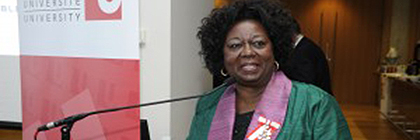The Centre for Feminist Research at York University has organized a new series of presentations focused on Islamophobia. The first event in the series, “Disrupting Islamophobia and Intersecting Oppressions in K-12 Schooling,” will take place on March 18, from 4 to 5:30 p.m. and will be presented using the Zoom Webinar platform.
Preregistration is required and can be completed at https://yorku.zoom.us/meeting/register/tJEkduCtrzgvG9KaNA1481rU0HzaIQH72Q9l. Interested participants are encouraged to register early for this event as there are a limited number of seats. The event will be recorded.
Despite a diversity of histories and lived realities, this webinar explores Muslim students’ and families’ experiences of Islamophobia and intersecting oppressions including anti-Black racism in K to 12 schooling contexts and beyond. Islamophobia and gendered Islamophobia manifest in the absence of policies and structures that acknowledge its existence or respond to its presence in Ontario classrooms. Transformative education has the possibility to disrupt and dismantle these harmful discourses and enactments in service of justice. Join us for a conversation with educators and community partners as they speak to possibilities for humanizing the diverse experiences of Muslim students in Ontario schools.
Panelists participating in the event are:
- Omar Zia, school administrator, Peel District School Board;
- Gilary Massa, human rights and outreach officer, Toronto District School Board;
- Amira Elghawaby, journalist and human rights advocate;
- Samiya Ahmed, parent and community activist.
The panel will be moderated by Faculty of Education Assistant Professor Vidya Shah and Course Director Sayema Chowdhury. Contributing to the development of the Centre for Feminist Research’s Spotlight on Islamophobia, are
- Ena Dua, associate professor, Department of Equity Studies and School of Gender, Sexuality and Women’s Studies, Faculty of Liberal Arts & Professional Studies (LA&PS);
- Zulfikar Hirji, associate professor, Department of Anthropology, LA&PS;
- Vidya Shah, assistant professor, Faculty of Education;
- Shirin Shahrokni, assistant professor, Department of Sociology, LA&PS;
- Nadiya Ali, PhD candidate, Department of Sociology, LA&PS;
- Sayema Chowdhury, course director, Faculty of Education.
The series is an attempt to further understand one of the most entrenched forms of racism. It focuses on key aspects of the social forces that shape and reinforce contemporary practices of Islamophobia. The Spotlight on Islamophobia event series aims at gaining a better understanding of the multiple forms of Islamophobia currently prevailing in multiple societies, grasping their historical origins in specific national contexts, and their intersections with other regimes of inequality and oppressive forces structuring contemporary human experiences.


















 A panel of experts will consider the role of education and the implications of COVID-19 on our understanding of climate change during the Annual Dr. David V.J. Bell Lecture on Feb. 23. The lecture is presented by
A panel of experts will consider the role of education and the implications of COVID-19 on our understanding of climate change during the Annual Dr. David V.J. Bell Lecture on Feb. 23. The lecture is presented by 



